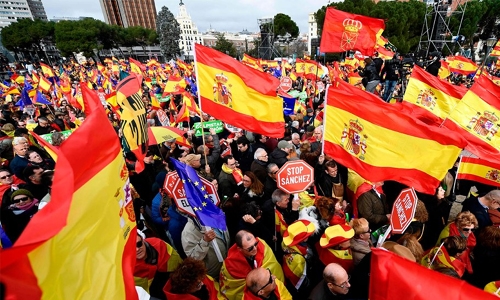Will Spain become a victim of the Catalan separatists?
Anyone looking for evidence of how irrational politics can be should look to Catalonia right now. Earlier this month, Catalan separatists in the Spanish Parliament voted against the 2019 national budget proposal of the Socialist prime minister, Pedro Sánchez, forcing a snap general election in late April. The separatists were retaliating against Sánchez because he would not agree to a referendum on Catalan independence. The last referendum, organised in October 2017, which was declared illegal by Spain’s Constitutional Tribunal and boycotted by those opposed to independence, plunged Spain into its deepest political crisis since the death of Gen. Francisco Franco in 1975.
In forcing early elections and the potential fall of the Sánchez government, which came to power in June following a vote of no confidence against Prime Minister Mariano Rajoy of the conservative Popular Party, the Catalan separatists appear willing to forfeit the best chance they have had in decades to advance Catalan autonomy. The Sánchez government has supported dialogue with Catalan separatists; appointed many Catalans to prominent cabinet positions, including Meritxell Batet, responsible for managing regional affairs; and agreed to a substantial increase in public spending in Catalonia for 2019.
It even consented to talks about amending the Spanish Constitution to expand autonomy for all of Spain’s regions. Those gains could be quickly erased if the Popular Party is returned to power, something that the separatists were apparently aware of when they voted against the budget proposal. The newspaper El País reported that separatist leaders voted “with long faces” because they knew that they were most likely contributing to the rise of a new government that could reimpose direct control of Madrid over Catalonia as the Rajoy government did in 2017.
Indeed, chances are that a new right-wing government in Madrid would be even more intolerant of Catalan separatism than Rajoy was. Since Rajoy’s departure from office, the Popular Party has hardened its stance on Catalan separatism, in no small measure because of the rise of Vox, a new far-right party that made a splash in regional elections in Andalusia in December, when it won 12 seats in the Andalusian Parliament on a platform that combined anti-immigrant rhetoric with a hard line on the Catalonia crisis. Vox has gone as far as to call for abolishing altogether Spain’s system of regional autonomy and outlawing separatist political parties. Why would the separatists possibly want this outcome?
For the simple reason that a viable path to securing Catalan independence remains elusive. Since 2011, both conservative and social democratic governments in Madrid have rejected a state-sanctioned independence referendum for Catalonia. So Catalan separatists are now banking on political victimhood as the best strategy for rebooting the independence project. To do this, they need to depict Catalonia as the victim of Madrid’s brutal oppression in the hopes that this would earn their cause international support. Carles Puigdemont, the president of Catalonia until he fled to Belgium, where he remains today, to escape prosecution from Spanish authorities for having declared Catalonia an independent republic, has been exploiting the violence around the 2017 referendum to demonstrate the lengths that Madrid will go to deny Catalans the right to self-determination.
On a recent trip to the United States, Quim Torra, Puigdemont’s successor, accused the Spanish government of violating civil and political rights in Catalonia and of holding “political prisoners.” At home, Catalan separatists have framed the trial that began this month of the 12 organisers of the illegal referendum on charges of rebellion and sedition as a persecution of Catalan nationalism. But for the victimhood strategy to succeed, the separatists need a better foil in Madrid than Sánchez and his socialist government. Rather than dialogue and compromise, the separatists appear to desire intolerance and intransigence — maybe even a dose of violence.
In other words, they want a Popular Party government supported by Vox and Ciudadanos, a center-right party from Catalonia that vehemently opposes Catalan independence. Because of the fragmentation of the party system, the results of an election more than a month away are difficult to predict. But given recent polling, it is easy to imagine the Popular Party — with support from Ciudadanos and Vox — being able to oust Sánchez. The consequences of a coalition government led by the Popular Party and incorporating Vox would extend far beyond the issue of Catalonia. It would be the first time the far right made it into a Spanish government since Franco’s death, and the toll on Spanish democracy would be enormous.
It could bring an assault on the hard-won rights of women, immigrants and LGBT people. It could also unleash a wave of nationalism not seen in Spain since the Franco regime, one that would undermine regional home rule not only in Catalonia, but also in other regions like the Basque Country. Enabling the rise of the far right into government would also be a betrayal of the traditional values of the Catalan nationalist movement. Since the transition to democracy, this movement has placed Catalan autonomy ahead of independence.
Its progressive wing, represented by the Republican Left of Catalonia, a political party founded in the 1930s, has a proud history of standing up for the rights of women, workers and sexual minorities. The separatists also need to consider that it is far from clear that a right-wing government would bring their region any closer to independence. In fact, the result of the strategy of victimisation in Catalonia could well be to diminish democracy for Spain as a whole.
Related Posts

